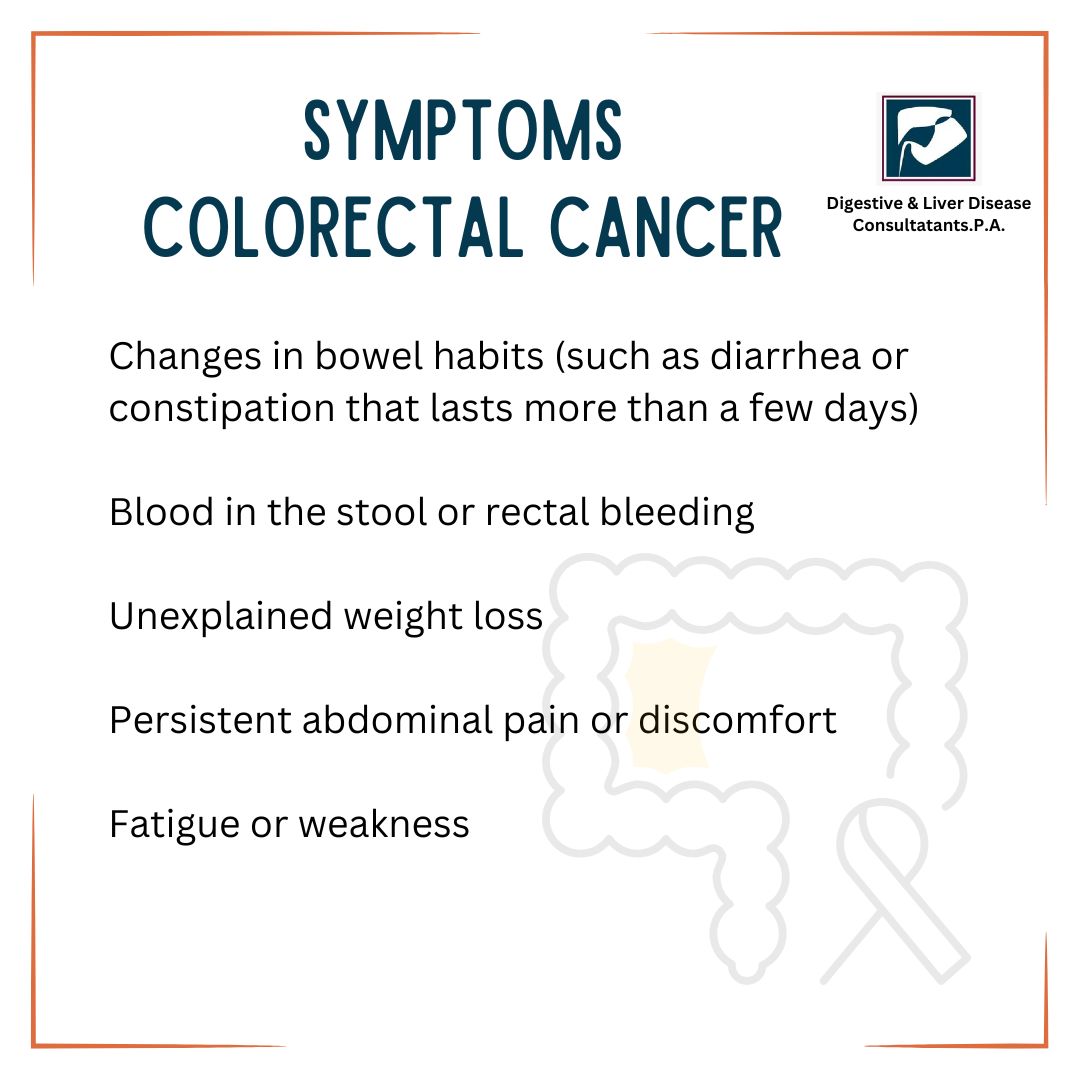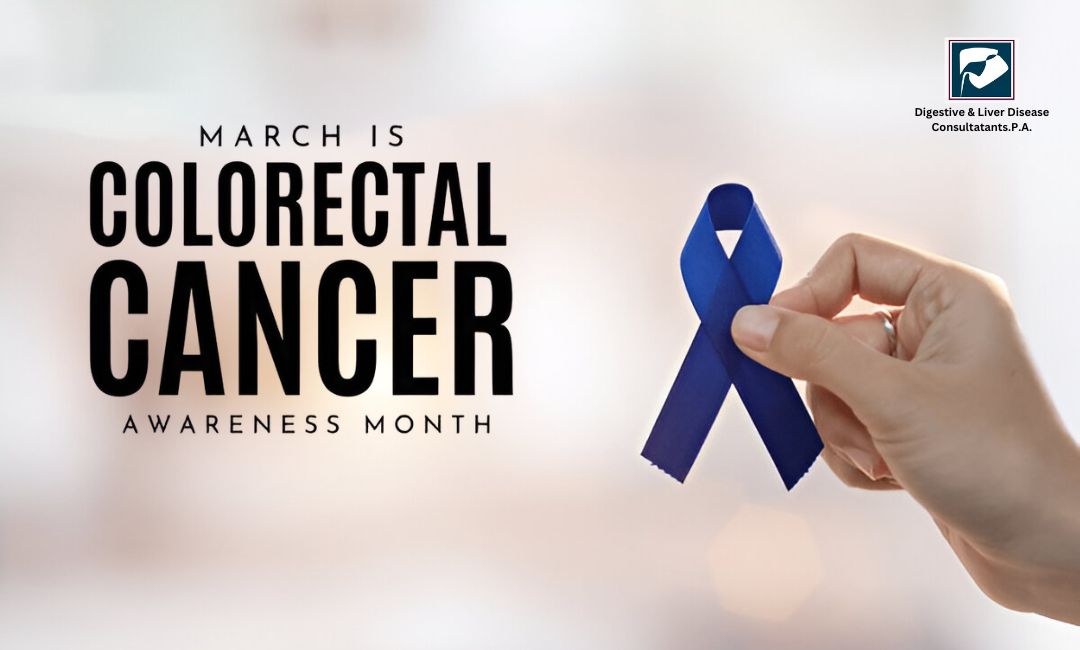March is National Colon Cancer Awareness Month, a time dedicated to raising awareness about one of the most common and preventable cancers. Colon cancer affects millions of people worldwide, but early detection and lifestyle changes can significantly reduce the risk. At Digestive & Liver Disease Consultants, P.A., we are committed to educating and helping our patients understand the importance of colon health.
In this blog, we’ll discuss the symptoms, risk factors, prevention tips, and the importance of screening for colon cancer. If you or a loved one is concerned about colon health, now is the time to take action.
What is Colon Cancer?
Colon cancer, also known as colorectal cancer, starts in the large intestine (colon) or rectum. It often begins as small growths called polyps, which can develop into cancer over time if not removed. The good news is that regular screenings can detect these polyps early, preventing cancer from forming.

Symptoms of Colon Cancer
Colon cancer often develops silently, without noticeable symptoms in its early stages. However, as the disease progresses, common signs may include:
- Changes in bowel habits (diarrhea, constipation, or narrowing of stool)
- Blood in the stool (bright red or dark-colored)
- Persistent abdominal pain or cramping
- Unexplained weight loss
- Fatigue and weakness
- A feeling that the bowel does not empty completely
If you experience any of these symptoms, it’s essential to consult a doctor immediately.
Who is at Risk?
Several factors increase the risk of colon cancer, including:
1. Age
Most cases occur in people over 50, but younger individuals can also develop colon cancer.
2. Family History & Genetics
If a close relative has had colon cancer, your risk is higher. Genetic conditions like Lynch syndrome and familial adenomatous polyposis (FAP) also increase the risk.
3. Diet & Lifestyle
A diet is high in red and processed meats, low fibre intake, smoking, excessive alcohol consumption, and lack of physical activity contribute to colon cancer risk.
4. Obesity
Being overweight increases the likelihood of developing and dying from colon cancer.
5. Inflammatory Bowel Disease (IBD)
People with conditions like Crohn’s disease or ulcerative colitis have a higher risk due to chronic inflammation in the colon.
Prevention: How to Lower Your Risk
While some risk factors like age and genetics cannot be changed, there are many ways to reduce your chances of developing colon cancer:
1. Get Regular Screenings
Colon cancer is highly preventable with routine screenings. A colonoscopy can detect and remove polyps before they become cancerous. It’s recommended to start screenings at age 45 (or earlier if you have a family history).
2. Eat a Healthy Diet
- Increase fibre intake by eating more fruits, vegetables, and whole grains.
- Reduce red and processed meats.
- Include healthy fats like those in fish, nuts, and olive oil.
3. Stay Active
Exercise regularly to maintain a healthy weight and lower inflammation in the body. Aim for at least 30 minutes of physical activity most days.
4. Limit Alcohol & Avoid Smoking
Smoking and heavy alcohol use increase colon cancer risk. Quitting smoking and reducing alcohol intake can protect your colon health.
5. Maintain a Healthy Weight
Obesity is a significant risk factor, so maintaining a balanced diet and regular exercise can help.
The Importance of Colon Cancer Screening
Screening tests help find colon cancer at an early stage when it is most treatable. The most common screening methods include:
Colonoscopy: The gold standard test that allows doctors to see inside the colon and remove polyps.
Stool Tests: Detect hidden blood or abnormal DNA in stool samples.
Flexible Sigmoidoscopy: Examines the lower part of the colon for polyps or cancer.
Early detection saves lives, and regular screenings can prevent up to 90% of colon cancer cases.
Digestive & Liver Disease Consultants, P.A.: Your Partner in Colon Health
At Digestive & Liver Disease Consultants, P.A., we specialize in the prevention, diagnosis, and treatment of colon cancer and other digestive disorders. Our team of experienced gastroenterologists is dedicated to providing top-quality care, from routine screenings to advanced treatments.
We understand that discussing colon health can feel uncomfortable, but our compassionate doctors ensure a stress-free experience. Our state-of-the-art facilities offer the latest technology for early detection and treatment, giving you the best chance at a healthy future.
When to See a Doctor
If you are experiencing any symptoms of colon cancer, have a family history of the disease, or are due for a screening, don’t wait. Early detection can save your life.
Schedule Your Colon Cancer Screening Today
If you are 45 or older, or have risk factors for colon cancer, now is the time to get screened. Digestive & Liver Disease Consultants, P.A. is here to help you take control of your colon health. Contact us today to schedule an appointment and protect your future.
Conclusion
Colorectal cancer is one of the most preventable cancers, thanks to early detection through regular screenings and healthy lifestyle choices. This Colorectal Cancer Awareness Month, take a moment to evaluate your risk factors, discuss your family history with your doctor, and consider scheduling a screening. The earlier colorectal cancer is caught, the easier it is to treat and manage.






